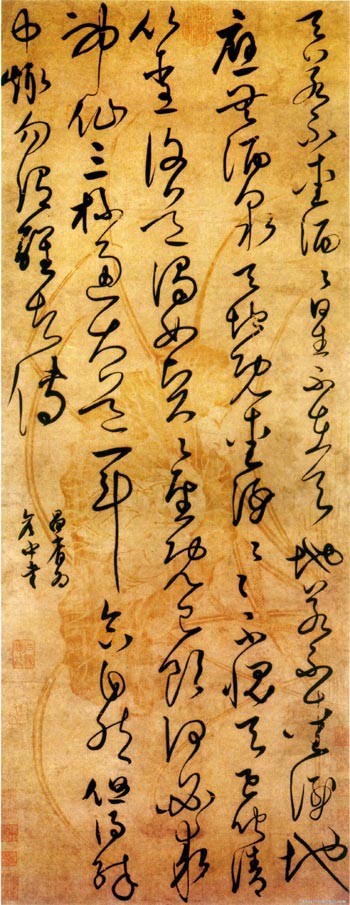Song Guang, his birth and death year is unknown. The word is Chang Yi, a native of Nanyang, Henan. Served as Tongzhi of Mianyang. Good at painting, but also good at cursive writing. Following Zhang Xu and Huai Su, his style is slightly changed, his brushwork is vigorous and smooth, and his posture is graceful. In the early Ming Dynasty, Song Ke and Song Cuan were both well-known for their good books, known as the "Three Songs". Ming Tao Zongyi's "Book History Meeting Yao": "The Guang cursive calligraphers Zhang Xu and Huai Su, Zhang Cao enters the gods." However, critics said that Song Guang's calligraphy style was thin and smooth, not as good as Song Ke's calligraphy achievements.

Cursive Script Li Baiyue Under the Poem of Alone Drinking on Paper Printed on Paper, Vertical 87cm, Horizontal 33.6cm Collection of the Palace Museum, Beijing
Explanation:
天若不爱酒,酒星不在天。地若不爱酒,地应无酒泉。天地既爱酒,爱酒不愧天。正闻清比圣,复道浊如贤。贤圣既已饮,何必求神仙。三杯通大道,一斗合自然。但得醉中趣,勿谓醒者传。
昌裔为彦中书

Cursive script Wind into the loose word axis, paper 1379, 101.7cm in length, 33.7cm in width, Collection of the Palace Museum, Beijing
Explanation:
画堂红袖倚清酣,华发不胜簪。几回晚直金銮殿,东风软,花底停骖。书诏许传宫烛,香罗初试朝衫。御沟冰泮水挼蓝,飞燕又呢喃。重重帘幕寒犹在,凭谁寄,银字泥椷。报道先生归也,杏花春雨江南。
洪武十二年夏五月,余于钟山挈累还吴。明年春又复徙家湖南昆丘。友人陆君德修颇爱眷之,将行,德修出此纸俾余书,遂录《风入松》二阕,以为复会张本云耳,匊水外史宋广昌裔识。








